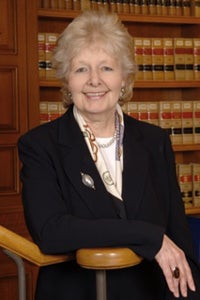Margaret H. Marshall, who served over a decade as Chief Justice of the Massachusetts Supreme Judicial Court, will join the faculty at Harvard Law School this spring as a senior research fellow and lecturer. A national spokesperson on the importance of independent state courts, she will teach a reading group on “Judicial Independence, Judicial Ethics and the First Amendment.”
Appointed as Chief Justice in 1999 by Gov. A. Paul Cellucci, Marshall was the first woman to serve as Chief Justice and the second woman appointed to serve as an Associate Justice in the Court’s long history. During her 14 years on the Court before stepping down in December 2010, she wrote more than 200 opinions, including the landmark opinion in Goodrich v. Department of Public Health in 2003, legalizing same-sex marriage in Massachusetts. The ruling made Massachusetts the first state to legalize gay marriage.
HLS Dean Martha Minow said: “Chief Justice Marshall has demonstrated brilliance and courage throughout her career, leading anti-apartheid efforts in the 1960s; championing educational progress here at Harvard and elsewhere; and galvanizing ground-breaking reform to the Massachusetts judicial system in the past decade. We at Harvard Law School are so honored that she will share her talents, experiences, wisdom, and brilliance along with her enduring commitment to access to justice.”
Upon her appointment, Marshall commented: “Harvard Law School is one of the great centers of legal scholarship. It is a privilege to be returning to a University that has been so important in my legal career, and to have the opportunity to teach and learn from a new generation of students who will in the future play such important roles in in all parts of the legal profession.”
In an April 2011 interview at Harvard Law School, Dean Martha Minow credited Marshall with modernizing the entire Massachusetts judiciary, spearheading a plan in 2002 to revolutionize the administration of the trial courts. She effectively streamlined the courts’ administration, developed performance measures, and devised a process for ongoing review and improvement of the courts in the Commonwealth. These reforms resulted in significant decreases in case backlogs and in the length of time between the filing and resolution of cases, as well as in cost-savings throughout the trial and appellate courts.
Born and raised in South Africa, Marshall obtained her baccalaureate in 1966 from the University of the Witwatersrand in Johannesburg. While an undergraduate, she was elected president of the National Union of South African Students, at the time a leading anti-apartheid organization. She came to the United States and Harvard to pursue her master’s degree in education, which she received in 1969, and then went on to receive her J.D. from Yale in 1976.
Marshall practiced law for 16 years in Boston and became a partner in the Boston firm of Choate, Hall & Stewart. In 1992, she was appointed vice president and general counsel of Harvard University, the first woman to hold that position. She has served as president of the Boston Bar Association, president of the United States Conference of Chief Justices (2008 – 2009), and chair of the Board of the National Center for State Courts. Marshall is a member of the Council of the American Law Institute, and a fellow of the American Academy of Arts and Sciences. She served as a fellow of the Corporation of Yale University from 2004 to 2010. She is the recipient of many honorary degrees and other professional awards.
